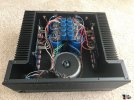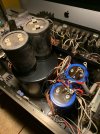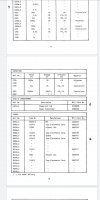here i go again.
i bought an adcom gfa 5500.
its lacking ass-end. someone here provided information that it is out of spec to due cap age.
a few questions, maybe.
1. i spent 500 on it. it will cost 245 for a recap kit. then ill be in for almost 800 not counting my time. going price is 500-700. id assume a good few have the same problem.
is it worth it.
2. its been a looong time since i was a practicing electronic tech though ive done a decent job soldering on some cables and switches i replaced.
i have good hand skills from my current job as a pedorthist.
not a cakewalk but i should be able to do it. can i do it?
i sorta thinking about doing it for the experience. but then id have another piece of equipment, one i might not use.
comments please.
if you have nothing positive to add please keep it moving.
i bought an adcom gfa 5500.
its lacking ass-end. someone here provided information that it is out of spec to due cap age.
a few questions, maybe.
1. i spent 500 on it. it will cost 245 for a recap kit. then ill be in for almost 800 not counting my time. going price is 500-700. id assume a good few have the same problem.
is it worth it.
2. its been a looong time since i was a practicing electronic tech though ive done a decent job soldering on some cables and switches i replaced.
i have good hand skills from my current job as a pedorthist.
not a cakewalk but i should be able to do it. can i do it?
i sorta thinking about doing it for the experience. but then id have another piece of equipment, one i might not use.
comments please.
if you have nothing positive to add please keep it moving.




